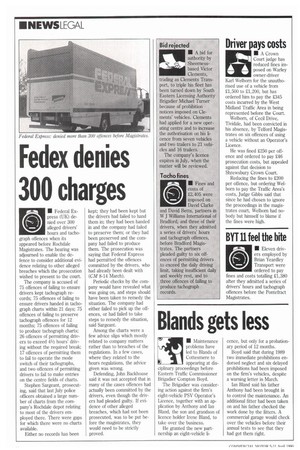Fedex denies 300 charges
Page 24

If you've noticed an error in this article please click here to report it so we can fix it.
• Federal Express (UK) denied over 300 alleged drivers' hours and tachograph offences when its appeared before Rochdale Magistrates. The hearing was adjourned to enable the defence to consider additional evidence relating to other alleged breaches which the prosecution wished to present to the court.
The company is accused of 75 offences of failing to ensure drivers kept tachograph records; 75 offences of failing to ensure drivers handed in tachograph charts within 21 days; 75 offences of failing to preserve tachograph offences for 12 months; 75 offences of failing to produce tachograph charts; 26 offences of permitting drivers to exceed 41/2 hours' driving without the required break; 17 offences of permitting them to fail to operate the mode switch of their tachographs, and two offences of permitting drivers to fail to make entries on the centre fields of charts.
Stephen Sargeant, prosecuting, said that last July police officers obtained a large number of charts from the company's Rochdale depot relating to most of the drivers employed there. There were gaps for which there were no charts available.
Either no records has been kept; they had been kept but the drivers had failed to hand them in; they had been handed in and the company had failed to preserve them; or they had been preserved and the company had failed to produce them. The prosecution was saying that Federal Express had permitted the offences committed by the drivers, who had already been dealt with (CM 8-14 March).
Periodic checks by the company would have revealed what was going on, and steps should have been taken to remedy the situation. The company had either failed to pick up the offences, or had failed to take steps to remedy the situation, said Sargeant.
Among the charts were a few advice slips which mostly related to company matters rather than to breaches of the regulations. In a few cases, where they related to the hours regulations, the advice given was wrong.
Defending, John Backhouse said it was not accepted that in many of the cases offences had actually been committed by the drivers, even though the drivers had pleaded guilty. If evidence of other alleged breaches, which had not been prosecuted, was to be put before the magistrates, they would need to be strictly proved.
















































































































































